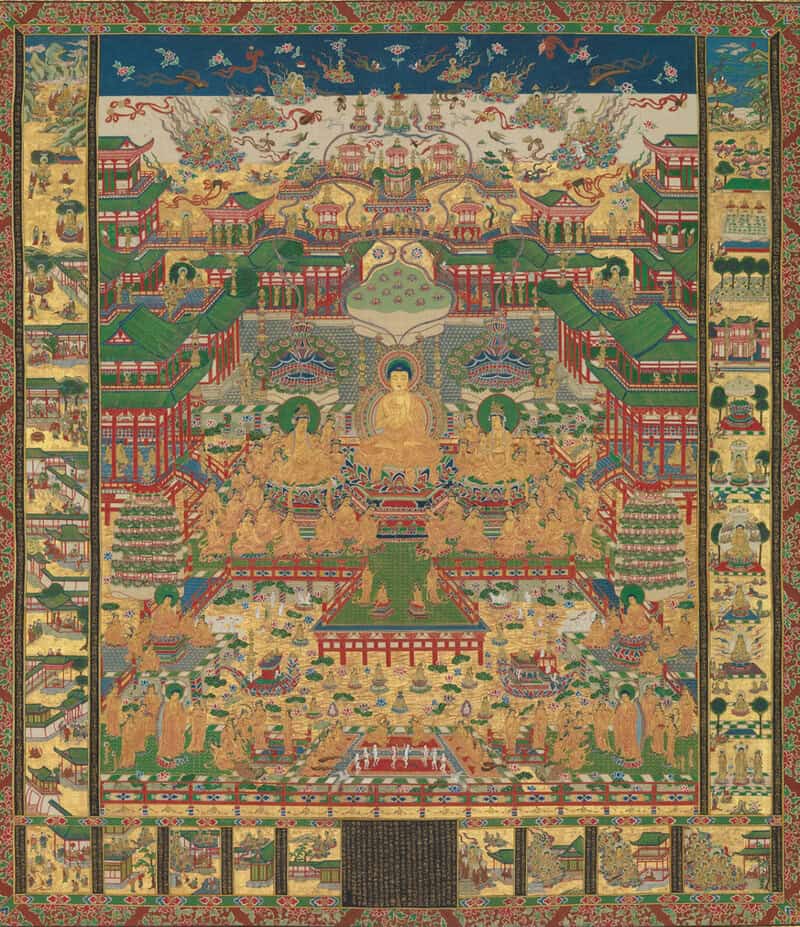Based on dependent origination something occurs, yet
There is no arising nor passing away.
There is no nihilism nor eternalism.
There is no coming nor going.
There are not many nor one event(s).
Whatever tends to be elaborated becomes almost calm again and again.
Nagarjuna

When you meditate it seems as though a lot of experiences arise. You see this, you see that, and it seems to pass into and out of awareness, each experience followed by another.
And yet as meditation deepens, the ability to clearly see ‘things’ or experiences fades away. This isn’t because your awareness is getting duller or you are losing your ability to retain any clarity in meditation. On the contrary, it actually happens as awareness and clarity deepen.
As your meditation deepens you find that what formerly appeared as substantial now no longer has such a distinct and demarcated identity. You increasingly find it hard to see exactly where ‘something’ is, or where it isn’t.
There seems little doubt that something is occurring, that something is arising. Yet you cannot in any way point to it, and say ‘this is this’ or ‘that is that’.
Do things arise? I really have no idea.
Do they cease? I don’t know.
Do they appear to arise – it would seem so. Where are they, or where were they – I have no idea. And so it goes.
Such definites as ‘it does exist’ fade away. They simply don’t hold. And equally their negation – it doesn’t exist’ don’t apply to what you experience, what you know – at all.
Mind is as it is. Experience is as it is. And there’s little that one can say about it.





Mark, thanks for your post. I am writing a paper on the relationship between mindfulness and extreme thinking and would love to use that Nagarjuna "Eight Extremes" quote. However, I can't find it anywhere else. Do you remember where you found it?
Where does COMPASSION enter in?
I think, it all comes to "natural compassion". Just compassion for yourself. Can you point to anything that is not you?
Your "body" is nonlocal in space, meaning it has no limits. Can you find the point where your body ends and space starts? I cannot. Therefore it must be limitless. Normally we think of space as separating objects but in fact it unites all that it contains. Bodies are space. Space is bodies.
Can you find anywhere your mind does not reach? Just try thinking of something you cannot think of. There is no such thing that you cannot think of.
How could this perfect and limitless compassion be improved on? Normally we think that ego is real, therefore we must generate compassion for other egos to counteract our ego.
When you find no identities, who would you be compassionate for?
Loving your true "selfless self" seems perfect primordial compassion to me. I thimk that this emphasis on conceptual compassion must be a provisional teaching until you find your "no-self". Then it becomes just a word.
Mark, thanks for your post. I am writing a paper on the relationship between mindfulness and extreme thinking and would love to use that Nagarjuna "Eight Extremes" quote. However, I can't find it anywhere else. Do you remember where you found it?
Wow, the eight extremes that you mentioned, are they all related to buddhist philosopher Nagarjuna?
Me too
Liz e
Compasion is indivisible from primordial consciousness.
As said in the vajra essence by Terton Dujom Linpa.
Where else can you find compassion if not not in the primordial consciousness. Is like being in the ocean and asking where is the water
Nagarjuna is the founder of Madhyamaka School of Buddhism and is also known as the friends of Nagas who gave Nagarjuna all the hidden Buddhist sutras that were protected by the Nagarjuna.
Nagarjuna is my empty hero! ^_^
In addition to being a poor student of Tibetan Buddhism, for a while, I was an even poorer student of Advaita (Hindu) non-duality. For the life of me, I do not see any difference from this Nagarjuna poem and the non-duality teachings of Advaita. Nothing arises, nothing passes away. Tony Parsons, the "most" non-dual of them all, calls it all a "Story" in which we think we are individuals. As someone who recently started studying Mahamudra meditation and meditating accordingly, I find the two approaches, Mahamudra and Advaita, nearly identical, with the BIG two exceptions of Tibetan Buddhism's dependent origination and its Bodhicitta teachings. (Of course, non-duality teachers might just say it's all part of the "story" of the All.) Then again, wisdom rarely arises in this mind so what do I know? lol.
Thank you for your insights. I have really enjoyed reading your blog. Well, someone has. Getting less and less sure each day just who or what that might be doing the enjoying. 🙂
Paul Stevenson
Sir,
Resting, watching, just being. What a wonderful way. So, where does compassion enter in? Is there a "next step"?
Thanks, Paul